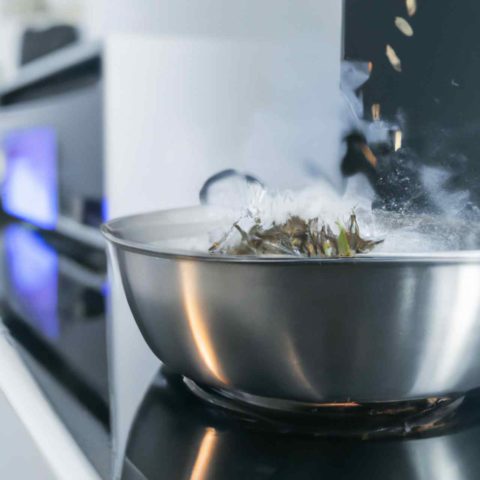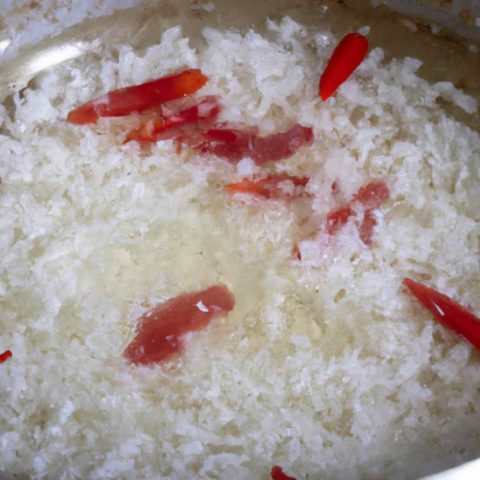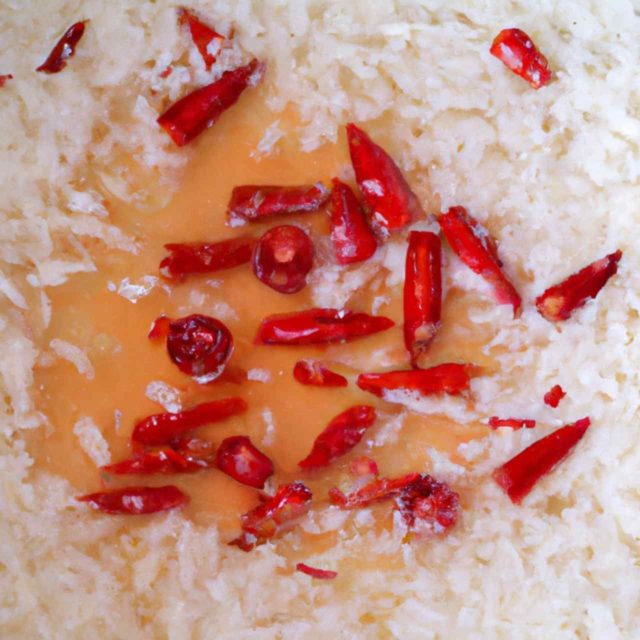Rice doesn’t taste very good when plain.
To solve this problem, chefs use seasonings to enhance the flavor of rice. Seasoning helps improve the texture and appearance of cooked rice, making it more appealing to eat, and these principles apply to all rice varieties (including Upland Rice).
Seasoning isn’t just for rice; it’s used to enhance the flavors of vegetables, meats, and other foods. So when adding seasoning to rice, be sure to choose the right type of seasoning for the dish. See how you can add flavor to rice without salt.
When to Season Rice – Seasoning or adding flavor to rice is an important part of rice cooking. But many people debate when you add the flavor – prior to cooking the rice, or do you cook the rice and then begin the rice seasoning process?
Should I Season Rice Before Cooking
My practice is that I always do it before cooking.
I feel as Rice absorbs water in the cooking process that, it has the greatest chance to take on the taste of the liquid seasoning.
My go-to seasoning is to use vegetable stock or chicken broth, adding dry herbs for more flavor. Sometimes I will add spices and even chili into the water as it starts to a boil.
How Do You Get Intense Flavor From Seasoning Into Rice
A great way is to premix all the herbs and spices ingredients together in a pot or bowl. Now cover or put a lid and allow them to rest for at least 30 minutes (or sit overnight). This allows the flavors to merge or mingle and subsequently infuse the rice when cooking.

This is because the starch in the rice will absorb any flavors that have been added during the cooking process.
In addition, the answer depends on what kind of rice you are using. If you’re using long grain white rice, you can add your seasoning after the rice has been cooked as it is more friendly to post-cooking seasoning.
However, if you’re making brown rice, you should add your seasoning at the beginning, as I find it a denser rice grain that takes longer to absorb the seasoning.
When Should You Add Seasoning to White Rice?
Seasoning adds flavor to food. The same goes for rice. Plain white rice tastes bland and unappetizing.
To solve this problem, chefs add seasoning to rice. Adding seasoning improves the texture and appearance of rice, making it more appetizing to eat.
White rice is often used in American cuisine. White rice has a mild flavor and soft texture. Because of this, white rice can be seasoned before and after cooking; both work. For the most intense flavor, you should pre-condition your rice. A good example of this is our Jollof Rice Recipe and also Yellow or Tumeric Rice, where flavors are infused before cooking.
When Should You Add Seasoning to Brown Rice?
Brown rice is often used in Asian cuisine.
Brown rice has a nutty flavor and aroma and a slightly chewy texture. Some even say it tends to have an umami flavor, especially when fried. It is quite dense rice with a strong texture; I find to get flavor into a brown rice dish, it is advisable to add the seasoning before cooking.

In fact, you can even add the seasoning to the cooking water before you start cooking to allow some of the aromatics from the herbs and spices to infuse into the rice cooking water.
When Should You Add Seasoning to Jasmine Rice?
Jasmine rice is often used in Indian cuisine. Jasmine rice has a sweet fragrance and tender texture.
People do not tend to season jasmine rice as much because it has its own unique flavor and that is often why you use this type of rice in the recipe that you are cooking.
Also, in Indian and Asian food where it is commonly used there as strong flavors from the accompanying dishes. So I tend not to season jasmine rice until after cooking, and the seasoning is just for the final touches of taste.
The same goes for basmati rice; you would tend to season after cooking. The only pre-cooking seasoning could be a little bit of salt.
Use the following guidelines to determine when to add seasoning to rice:
Adding seasoning to rice when cooking ensures that the rice gets seasoned evenly throughout. You do this when the rice needs to have its own unique flavor rather than relying on the side dish which accompanies the rice.
When Baking Rice, When Should The Seasoning Be Added
When you are baking rice for a big group, the seasoning should be mixed in with the rice before cooking. The reason is that it is a different method than cooking rice in liquid, where the seasoning can easily be distributed via the liquid.
When baking rice, you need to mix the seasoning and the rice well before you start baking so that you do not get pockets of intense flavor and other pockets of no flavor at all.

Should You Season Rice Before Cooking It in A Rice Cooker
Yes, I always season my rice before cooking it in a rice cooker because it uses a combination of liquid and steam, which are perfectly absorbed into the rice during the cooking process. Therefore if you have the seasoning in at the start, you are going to get the maximum effect. However, if you are using an intense and strong seasoning, then perhaps that will be sprinkled on as an afterthought when you serve the dishes at the table.
Can You Add Seasoning to Boiling Rice
Yes, you can boil rice with spices, but it is best if you put the seasoning in before the boiling begins.
What Is a Good Seasoning to Add to Rice
In addition to seasoning rice, you can also add other ingredients to enhance the flavor of the rice. For example, you can add herbs such as basil, cilantro, mint, parsley, rosemary, sage, thyme, tarragon,
How Do You Season Rice After Cooking
You can also add stronger spices such as black pepper, chili flakes, coriander, cumin, and ground fennel seed to impart true exotic herb aroma and flavor. Add it when the rice is hot though, for maximum effect.
This is a great way to add extra seasoning to Mexican rice.
How Do You Make Rice Not Boring
You can even add dried fruit like raisins, cranberries, currants, apricots, dates, figs, mangoes, and dried apples to make the rice not boring.
And finally, you can add sauces such as barbecue sauce, teriyaki sauce, hoisin sauce, pesto, chimichurri, salsa verde, balsamic vinaigrette, and salad dressings.
Be creative! Experiment with various combinations of flavors and textures to create delicious dishes.
Did you know that dried Rosemary will soften to the texture of crunchy rice if cooked in the water.
The other reason why you might add some spices and herbs after cooking is not only for flavor but also to add some color to the rice dish. Having some bright green herbs with some intensely colored red pepper flakes makes very colorful rice; in fact, I have done that at the Christmas table using fresh green herbs in bread chili flakes to make Christmas-coloured rice.
Make sure when you buy your rice, there are no rice hulls as they are largely impervious to seasoning. Good quality rice will all have been removed, but sometimes farmers’ markets have lower quality.
Other things to consider when seasoning rice before or after cooking are whether the herbs or spices are soluble in water. If they are, then they can easily be used with water.
If, however, they are only fat-soluble, and the rice is cooked without fats, then they are not going to impart much flavor and will remain separate, and there is little advantage in adding into a rice cooker, for example which uses only water.
In The book – “On Food and Cooking” (McGee) notes in chapter 8, “oils and fats dissolve more aroma molecules than water during cooking, but also hang on to them during eating, so that their flavor appears more gradually and persists longer.” (p.399)
Conclusion
If you are going to be using the rice for something like paella, where you want the flavors to come through in the final dish, it’s best to start off by cooking the rice first. If you’re just making plain white rice, however, you can go ahead and add your seasoning after the rice has been cooked.
I’m going to go out on a limb here and say that yes, you should season rice before cooking it. Why? Because if you don’t, you might end up with bland rice, which isn’t very appetizing. And besides, seasoning rice adds flavor and makes it easier to digest. But if you’d like to skip the step, feel free to use plain old water instead. Just remember that when you cook rice, you want to add enough liquid to cover the grains completely.